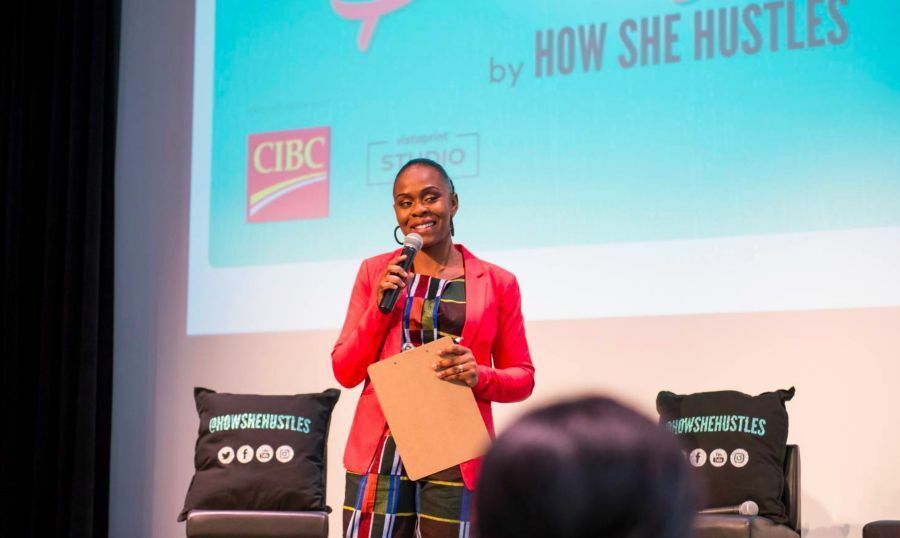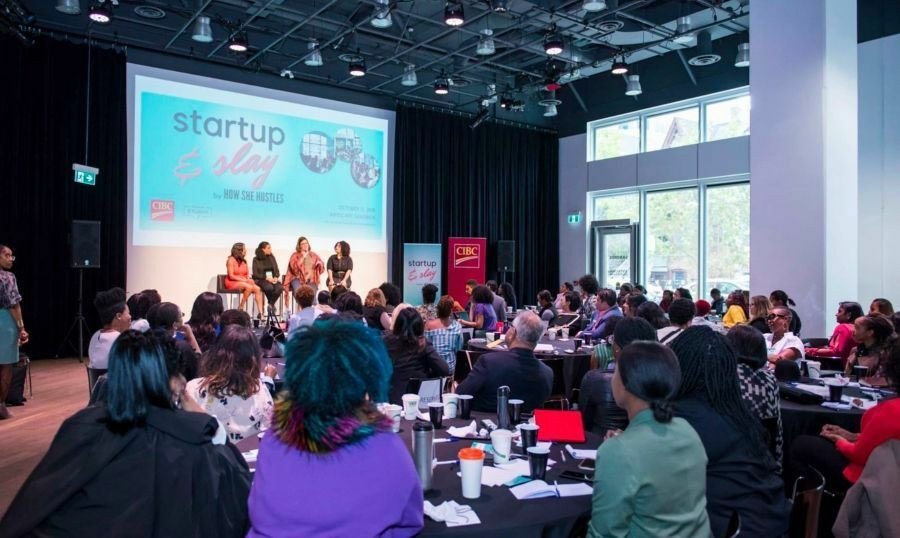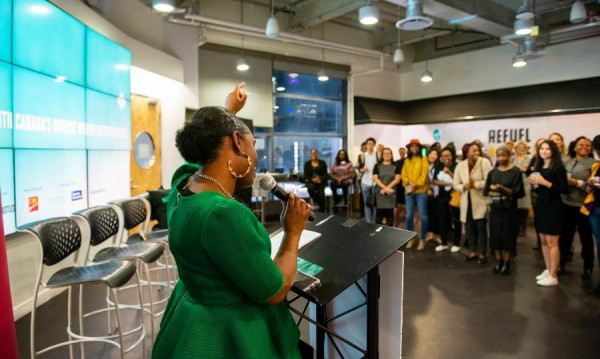Over the weekend, women from all over the greater Toronto area convened at the Artscape Sandbox for the final event of the year from the How She Hustles series called Start-up and Slay, the brainchild of Emily Mills.
Recently quitting her job at the CBC, Emily has made the leap to run How She Hustles full time with a mission to empower women with knowledge, resources, and networking.
From start to finish the conference was packed with practical information for participants to apply to their businesses or side hustles.
Start-up and Slay consisted of four panels; Navigating the Start-up Ecosystem, Managing Your Money, Mastering Media Interviews and How to Slay on Social Media.
The event was over five hours long, so here are the essential takeaways for you to slay in your business.

Navigating The Start-up Ecosystem Panel
Emily Mills kicked off the first panel, discussing what entrepreneurs should do in the beginning stages of their start-up. Some essential advice the panel shared were:
Be an Expert in Your Field: equipping yourself with the knowledge and skill set to be an expert will give you the confidence you need to succeed. Panelist, Michelle Lochan, gave an example and said if your business sells black cake, be an expert in black cakes and the ingredients in your product.
Create a Community That Supports You: Whether it’s friends or family, your community is life-saving and will help you stay balanced. The Panel suggests the women have a support ‘girl squad’ they can turn to.
Document Your Businesses Success: As your business grows, for every customer that likes your product, ask for testimonials and share them. Michelle called this marketing validation.
Use Small Business Resources: Programs like Futurpreneur Canada, have business plan writers and other resources to help you with your business. Do not be afraid to ask for help, taking advantage of resources can be the make or break of your business success.
Guard Your Heart: In business and your personal life, Saadia Muzaffar, shares that start-up business owners need to remember to guard their heart and their humanity. At times business can get ugly, but remembering who you are and your purpose will help you not fall victim to setbacks.
A participant asked the panel, what is a mindset that you had to overcome? Saadia answered saying she had to overcome learning when to walk away or say no to things that did not fit her. She says “I had to lose my desperation to fit into other people’s expectations to get a job.” Knowing when to let go or say no to things that do not align with you, is essential for growth and expansion. Karen Greve answered saying she had to overcome lack of self-confidence.
Managing Your Money Panel
Karlyn Percil, Certified Neuro-Success & Emotional Intelligence Coach, was the moderator for the managing your money panel. Here is some adaptable advice the panel shared.
Save, Save, Save: Panelists agree that small businesses need to focus on saving even when their business is turning a profit. Rubina Ahmed-Haq, suggests having at least six months of business and life expenses saved up.
Pay Yourself: When your business begins to make a profit, pay yourself, even if it’s only twenty-five dollars. Starting the habit of paying yourself, is one of the determining factors of the success of your business.
Invest in Yourself: When your start-up begins to make a profit, invest in yourself, which will further increase your profit. Invest in courses, business events, conventions, subscriptions, etc. This contributes to capital for your business.
Pay off Your Debt: It’s that simple, you can’t be in the black if you are technically still in debt.
Invest: The panel proposes investing in other startups, stocks, RRSP’s and high-interest savings accounts.
Tools For Budgeting: The panel shared that the majority of the time they budget the good ole’ fashion way, with a pen and paper; but Jalisa Luces-Mendes, founder of Toni Marlow says she uses an app called Wave.
The panel also said they use Google Docs and Microsoft excel sheets, to create and maintain their budgets.
Knowledge is Power: Catherine Hudson, a business advisor from CIBC said one major mistake a lot of new business owners make is not having enough understanding before making significant decisions. She says business owners need to know who their customers are, be aware of their competition; and if they plan to open a store, know the traffic of the location, the demographics and if a business like yours is wanted and needed in that particular area.
Use Your Marginalization To Your Advantage: Jalisa Luces-Mendes shared a valid perspective, saying, “everyone can fit within a marginalization, so business owners should use that to their advantage when searching for funding.” She suggests typing in your marginalization like a woman, LGBT, Black, Low Income, etc. and then typing “pitch, grants, awards, bursaries, funding” etc. and that should help in the process of searching for funds to support your business.
Another tip is to have separate personal and business accounts, and not to mix them.

Mastering Media Interviews Panel
The panelists of this segment had very different experiences in media and shared useful tips and information for businesses that wish to garner media attention.
Pitch Emails: Fenella Bruce, confessed that she receives approximately four hundred e-mails a day and that Mondays are the hardest to field through all the emails; so, if you send a pitch and do not receive a response, send one follow-up email then drop it all together. The panel says, do not continue to email and follow up, because you just become annoying.
A Big Story: Panelist share that when seeking out stories, they want big, human interest stories; because it has the potential to reach a broader audience. An example of a start-up business that fits this mold is the daycare in Toronto that provides extended childcare to parents who work non-traditional hours. The bigger story here, the panel explains is the lack of flexible and affordable childcare.
T.V Story: The panel shared elements that are needed to make TV news. The three major elements mentioned were, it should be current news, trendy, and catchy; including a human-interest component.
The panel agreed stories that have a higher chance of getting picked up are exclusives. Editors and producers like to break stories to the public. If a business is doing something inventive, but the public already knows about it, it’s less likely the story will get picked up. The panelist also warn, the media world can be a difficult one to navigate, but always being professional will take you a long way, because people talk.
How to Slay on Social Panel
The women on the final panel had some resourceful information and tips to share with the participants.
Accounts: Just like for your finances, the panel suggests having separate social media accounts for yourself and your business. Keeping business, separate from personal, can help your customers understand your brand and your business better. They also suggest having all of your contact information on your social media platforms, so customers can easily contact you.
Engagement: Engagement is essential, in any business model, but social media engagement is of high importance. Cher Jones, social media expert says LinkedIn is her favorite social media platform; she says “follow the money” and to pay attention to where people are listening and engaging with you the most. She also said she believes the algorithms, can detect posts using scheduling tools, and the algorithm won’t give those posts more engagement because there is no real human engagement at the moment.
Eden from Black Foodie says, that if she uses scheduling tools like Grem and Instaberry, she will go and engage after the post is made through the comments, etc. The ladies agreed that if business owners decide to use scheduling tools for their social media posts, that they shouldn’t use it more than fifty percent of the time.
Recommendations: Avery Swartz, suggested two books, “Traction” and “The Lean Startup” for anyone seeking literature to help them during their start-up journey.
Navigating the world of entrepreneurship can be difficult, especially if you are a woman; but thanks to initiatives like How She Hustles, ladies all over Greater Toronto area are given the opportunity to expand their knowledge base and their network.
Kezia Royer Burkett is a creative freelance writer with a degree in communications and multimedia from McMaster University. When she is not writing she is finding inspiration living life, raising her son and spending time with friends and family.

 By Kezia Royer - Burkett
By Kezia Royer - Burkett 








